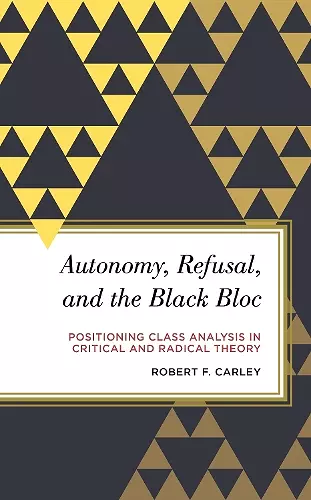Autonomy, Refusal, and the Black Bloc
Positioning Class Analysis in Critical and Radical Theory
Format:Hardback
Publisher:Rowman & Littlefield International
Published:11th Jul '19
Currently unavailable, and unfortunately no date known when it will be back

Autonomy, Refusal, and The Black Bloc reinterprets the positioning of critical and radical theory by focusing squarely on the role of class analysis. It also argues that the survivance of The Frankfurt School style of critique is wholly dependent upon the traditions of radical theory that find their same departure point from out of “the great refusals” of the 1960s and 1970s. By linking together the traditions of critical and radical theory through the work of Marcuse and Negri and by demonstrating their conjunctural and historiographical connections, Carley argues that the inventive strategic and organizational contexts that give rise to the black bloc tactic constitute a new political expression of class and, more forcefully, constitute the meaning of class politics for the late 20th and 21st century.
These are fighting words. Part genealogy of critical theory's strongest sinews, part corrective to the distortions of posers, Carley's mastery of the literature is bested only by his contempt for those who fake it. Every theory must find its limit situation, and Carley makes plain that, at its threshold, "autonomy" demands the repolarization of our one-dimensional world. Read at your own risk! -- AK Thompson, Author of Premonitions: Selected Essays on the Culture of Revolt and Black Bloc, White Riot: Antiglobalization and the Genealogy of Dissent
Contra Antonio Negri’s criticism of the black bloc movement as “solitary” and “individual,” Carley argues powerfully and lucidly that the black bloc movement involves not merely isolated incidents of revolt, but an “affirmative and active” practice of progressive and constructive reconfigurations of social relations. This is an important contribution for anyone attempting to theorize, and support, contemporary social movements, and particularly the urgent issue of their organization or lack thereof. -- Pierre Lamarche, Professor of Philosophy, Utah Valley University
ISBN: 9781786608802
Dimensions: 237mm x 161mm x 15mm
Weight: 363g
118 pages